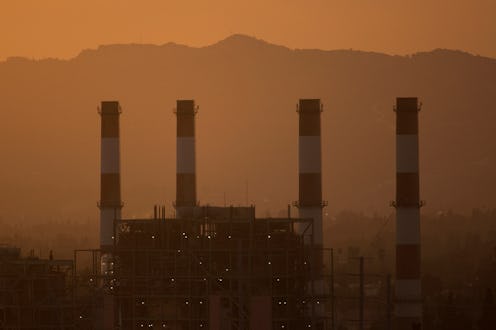Life
Why Climate Change Is Bad For Your Mental Health

In a world where it often feels like climate change is an unstoppable force (for instance, the Great Barrier Reef is now "officially" dying, according to news out earlier this week), most of us are probably more focused on attempts to make specific, focused environmental change — like stopping coal-mining or cleaning up air pollution — than we are on the environment's impact on us. And yet the struggle for the planet's health is about more than just the environment itself; it's about our own mental capacity to handle our situation —and climate change is already making things much worse.
The ways in which climate change puts the squeeze on the mental balance of the human population are only really just beginning to be tabulated, but they're significant. A new study out this week from the American Psychological Association found that the issues of climate change can negatively impact our mental health, seeping into our mental groundwork and upsetting the foundations. Mental health isn't all about imbalances in serotonin or dealing with childhood issues; it's also highly reactive, and a volatile, changing, and unhealthy environment can bring about psychological crises.
As we prepare to celebrate Earth Day this weekend — and prepare to fight the Trump administration's negative environmental policies every day — it's time to truly understand that environmental destruction impacts us all, at every level.
Natural Disasters Do More Than Just Injure Our Physical Selves — They Create Mental Health Crises
The big and obvious issue, as the new APA report and other surveys of climate change and mental health have acknowledged, is that there is now an increased likelihood of natural disasters in a world prone to severe weather events — and that is bad for everybody's sanity. The ways in which disasters can cause damage to our mental health are legion; one study summed them up as "trauma, loss and crisis."
From the difficulties of replacing a home or its effects, to the serious psychological consequences of losing family members or friends, to the ways communities unspool and splinter after a place is hit by something seriously destructive, disasters ratchet up stress levels and negatively impact our mental health, causing anxiety and high incidences of PTSD and survivor's guilt. On a practical level, disasters can also make it harder for people to physically access help from mental health support services.
And that's before we take into account secondary disasters — the wars, conflict and violence that occur as a result of climate change's increasing pressure on resources and communities.
Climate Change Reshapes Our Lives Even When There Isn't A Natural Disaster
The extent of climate change's effects on mental health are, however, a lot more wide-reaching than just the trauma of recovering from a serious event. The long-term impacts on the way people live and work, and what is and isn't sustainable, are big catalysts for mental health issues, too. The APA explains:
"Changes in climate affect agriculture, infrastructure and livability, which in turn affect occupations and quality of life and can force people to migrate. These effects may lead to loss of personal and professional identity, loss of social support structures, loss of a sense of control and autonomy and other mental health impacts such as feelings of helplessness, fear and fatalism."
It's estimated that in the 21st century, climate change refugees — people fleeing from disasters, unlivable conditions, famines, floods and slowly water-covered areas — may number above 30 million. And that doesn't count those who'll migrate before things get radically bad in the hope of finding better circumstances elsewhere, rather than being pushed out by emergency.
As the climate shifts, it changes the ways in which people can survive, and when their lives are overturned and relocation becomes essential, they're much more likely to experience serious stress, depression, alienation, anxiety, trauma, deep fear and other hugely pressuring emotions. A study in 2011 found that even for migrants shifting under relatively quiet conditions, three main pressure areas — "changes in personal ties and the reconstruction of social networks, the move from one socio-economic system to another, and the shift from one cultural system to another" — create big strains on personal health, and discrimination and struggle in a new place really doesn't help.
Warmer Temperatures Lead To Greater Human Conflict
It's been discussed previously, but it's worth reiterating it now: climate change can genuinely shift the ways in which we relate to other humans, and that can have distinct consequences for our own ability to be mentally resilient. A study in 2013 found that in periods of warmer temperatures, human levels of interpersonal conflict and violence appeared to rise — a finding that's been correlated by modern studies on the tie between high heat and frayed tempers in cities. As the thermometer rises, humans appear more fractious — partially, as National Geographic wrote in 2010, because of opportunity: people are more likely to be outside and clashing with other groups in hot weather, rather than snuggling inside against a cold snap.
This may create an escalating climate change issue for mental health. Temperatures, plus adverse conditions like lower crop yields and natural disasters, may increase the likelihood for violence and serious conflict, which in turn will raise the possibility of serious disruption to peoples' lives, migration, loss, trauma and stress.
The APA recommends that people begin to note the mechanisms that might cause serious mental health problems and start to build resilience by making sure they have strong support networks — but, for obvious reasons, they point out that taking steps to go green, from using public transport to trying sustainable energy, is a wise investment for the community and for your own brain.